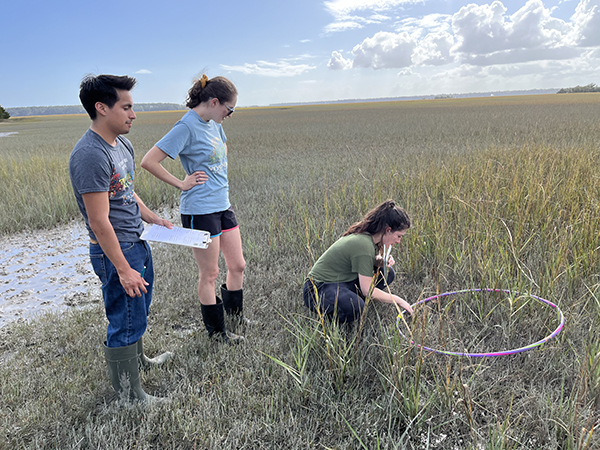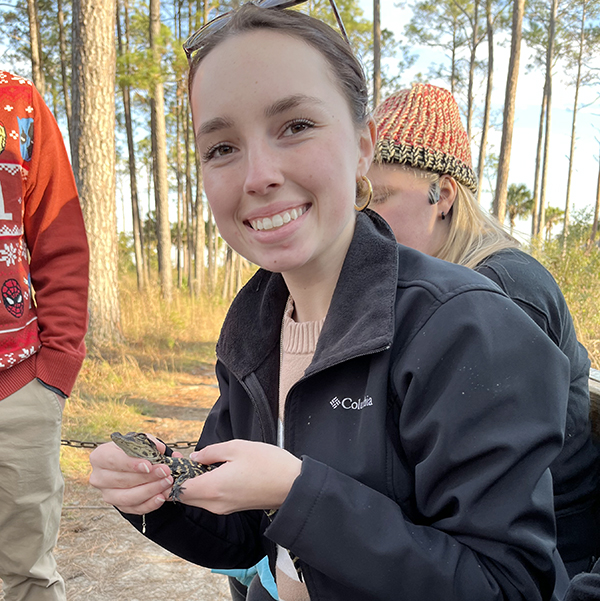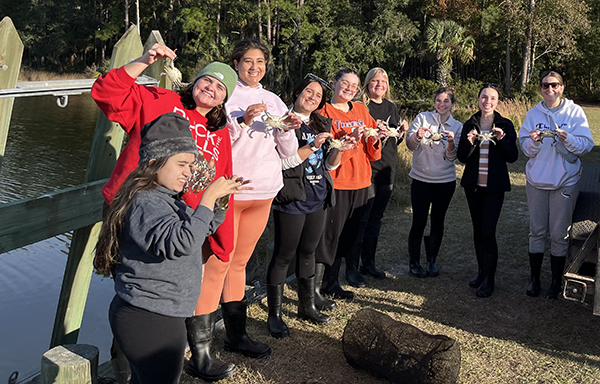Future Teachers Learn by Doing: Project-Based Education Boosts Science Skills

This fall, education majors from the University of South Carolina Beaufort (USCB) visited a Gullah-Geechee farm, measured the salinity of salt water, learned how to create a schoolhouse gardens and more, gaining skills in science education while engaging in hands-on, experiential learning.
These community-driven experiences were all part of their science science teaching methods courses and a new course offering, Introduction to Life Science. Early childhood and elementary educations students tackled real-world environmental issues and conducted scientific investigations as they learned how to teach the next generation of learners. Instructor Kathryn Madden said her goal in the course was to help each future teacher “experience as a student, then reflect as an educator.” Madden is an instructor with USCB Education Department working under the MASTERY Grant – a collaboration with Beaufort County Schools focusing on recruitment and retention of teachers in our area.
Madden guided her students through the newly adopted South Carolina 3D science standards, contextualizing the content to real-world examples. Students were tasked with addressing urgent community challenges, such as the effects of rising tides and urban development on local ecosystems, while building STEM experiences that foster active participation and critical thinking in young learners.
Real-World Environmental Issues Meet Classroom Learning
At the heart of the project-based learning model was a driving question: How do we, as science teachers, design and implement integrated STEM experiences that engage students in addressing real-world challenges related to environmental changes?
"Our goal is to equip future teachers with the skills and knowledge they need to teach science not just from a textbook, but through active, inquiry-based learning that connects students with their local environment," Madden said. "By partnering with community organizations and engaging with real-world problems, we hope to inspire our future educators to think critically about science instruction and its role in building a sustainable future."
Community Partnerships Fuel Learning and Innovation

Community partners have been a crucial element of the program. A $65,000 grant from the Community Foundation of the Lowcountry is helping revitalize the USCB Bluffton greenhouse, transforming it into a living laboratory. By raising native plant seedlings, early childhood education majors are gaining valuable skills that will help them start or maintain gardens at the schools where they will work in the future. By integrating gardening into science instruction, they will engage their young students in conservation and environmental science.
For elementary education majors, the Lowcountry’s salt marsh ecosystem provided a natural classroom for scientific exploration. The students worked with scientific equipment to measure water salinity at Widgeon Point and examine the park’s salt marshes. The region’s marshes play a vital role in mitigating the effects of rising tides.
“We're grateful for the support of organizations like the Hilton Head Turtle Trackers, who provided a $2,500 grant to support these educational experiences," Madden said. "These collaborations not only provide our students with hands-on learning opportunities but also help connect them to the broader community they will serve as educators."
Hands-On Learning Opportunities and Field Trips

Local organizations contributed resources, field trip opportunities, and expertise, enriching the students' understanding of the importance of discovery and wonder.
Tony and Belinda Jones of Morning Glory Farms invited the USCB students on an unforgettable Gullah-Geechee cultural experience, where they learned about traditional farming practices that have shaped the region’s coastal communities for centuries. “Learning about the intersection of culture, farming, and the environment was invaluable for our future educators,” said Madden. “These experiences will inform how they teach students about sustainability and the importance of local ecological knowledge.”
The Spring Island Trust hosted field trips and educational programming including interactions with baby American alligators and non-venomous native snakes. SCETV Coastal Kingdom provided video content for in-depth exploration of the Lowcountry’s coastal environments.
Beaufort County passive parks and naturalists, one a USCB graduate, welcomed and hosted students in hands-on salt marsh explorations and want to host more of these experiential science education events.
Further support came from these community organizations that helped bring the project-based curriculum to life:
- SC SeaGrant
- Mr. Floyd’s 7th-grade science class at Whale Branch Middle School
- Heritage Community Farms
- South Carolina Department of Environmental Services
- Beaufort County Passive Parks
By using local, real-world environmental challenges as the basis for their studies, these future educators gained scientific knowledge and learned how to teach in ways that are interdisciplinary, engaging, and relevant to their students' lives. With community partnerships, real-world environmental challenges, and a commitment to inquiry-based learning, the stage is set for these future educators to lead with creativity, passion, and purpose.
- USCB -
KM • 12/02/2024